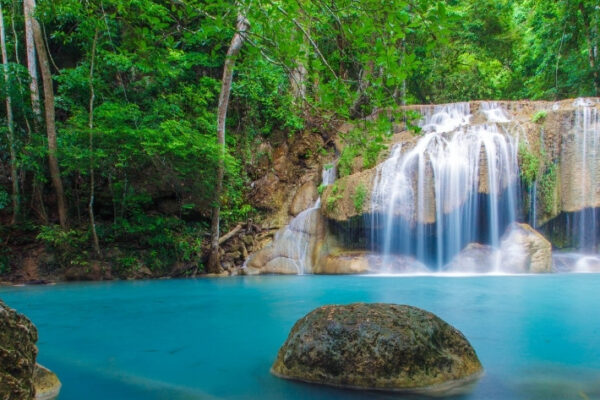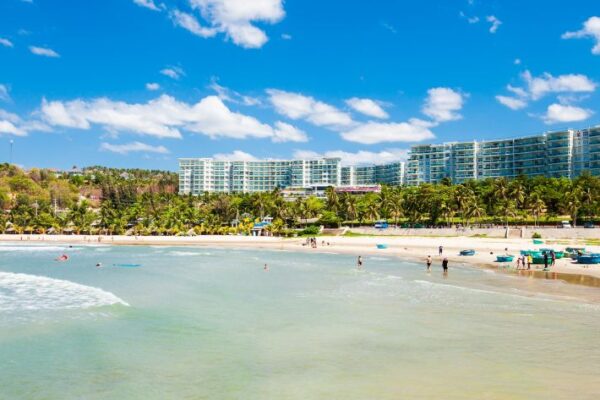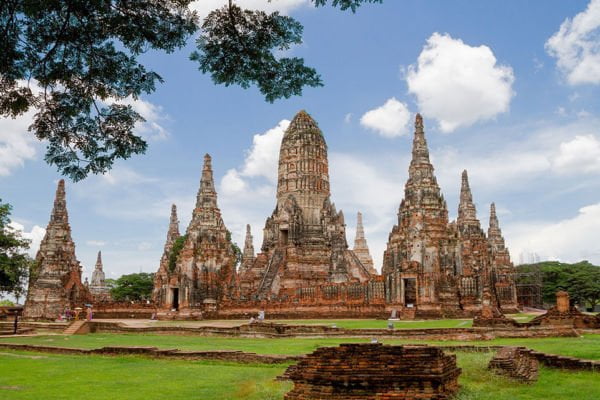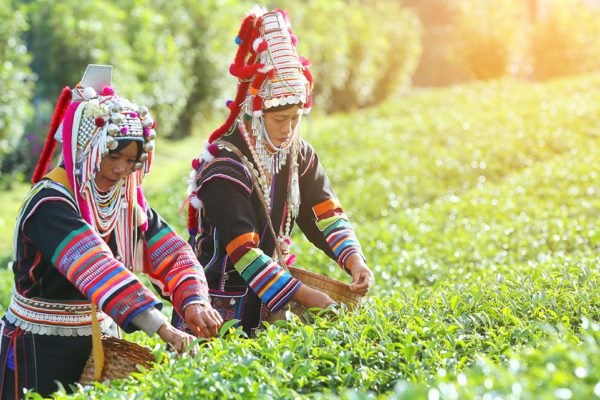The Most Colorful Thailand Festivals You Shouldn’t Miss
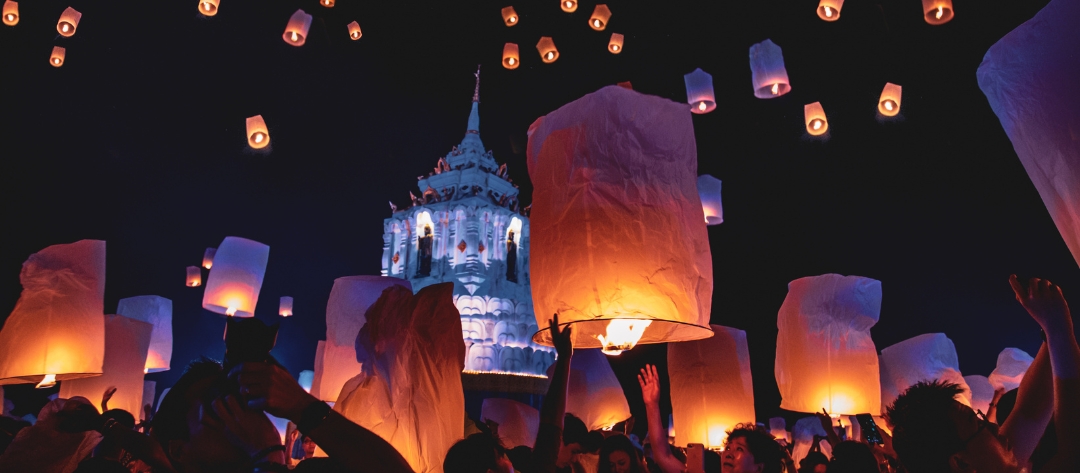
Thailand is a vibrant country where tradition and celebration come together beautifully. From ancient temple rituals to lively street parades, Thailand festivals reflect the nation’s rich culture and joyful spirit. With festivals occurring throughout the year, planning your visit wisely can help you immerse yourself in authentic Thai culture. This guide highlights seven must-see festivals that offer a unique glimpse into Thailand’s enchanting traditions.
A Thailand Month-by-Month Festival Wrap-up for Travelers
With a calendar full of vibrant events, every month offers something unique for travelers and locals alike. Let’s take a month-by-month look at the most iconic celebrations across the Land of Smiles.
January
The new year begins with fireworks, cheers, and blessings. New Year’s Day is celebrated nationwide with gatherings at temples and public countdown events.
In Bangkok’s Chinatown, Chinese New Year brings the streets to life with dragon dances, glowing lanterns, and traditional performances. For food lovers, the Chiang Mai Food Festival is a January highlight—think of aromatic local dishes, cooking demos, and cultural showcases in the heart of northern Thailand.
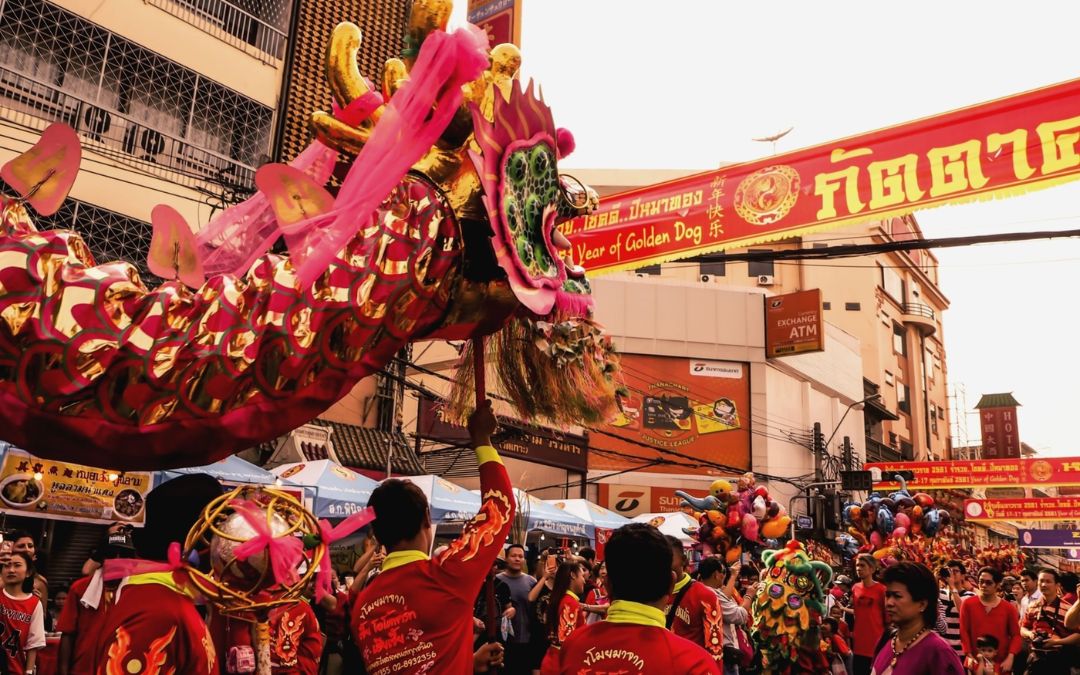
Chinatown in Bangkok glows bright during Chinese New Year.
February
Nature and faith bloom together this month. The Chiang Mai Flower Festival fills the streets with color through flower floats, beauty pageants, and lively performances. Meanwhile, Makha Bucha Day, an important Buddhist holiday, is observed with peaceful candlelight processions at temples nationwide.
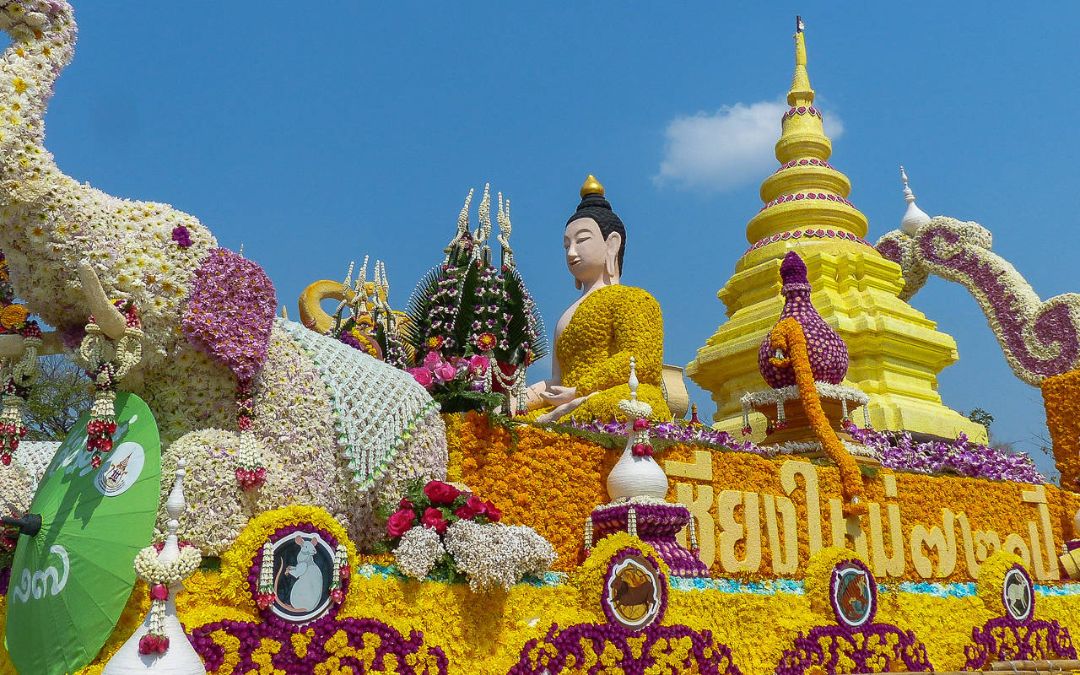
The flower festival in Chiang Mai fills the city with color.
March
Spiritual journeys take center stage. Pilgrims from across the country travel to Khao Khitchakut National Park to worship the Buddha’s footprint. This annual trek is both a physical and spiritual journey, attracting thousands seeking merit and blessings.
April
Time for water and renewal! April hosts Songkran, which is one of Thailand’s most famous festivals. What begins as a sacred New Year’s cleansing ritual has become a joyful nationwide water fight.
Whether you’re in Bangkok or Chiang Mai, prepare to get soaked. Also in April, the Phanom Rung Festival transforms an ancient Khmer temple in Buriram with traditional ceremonies and magical light shows.
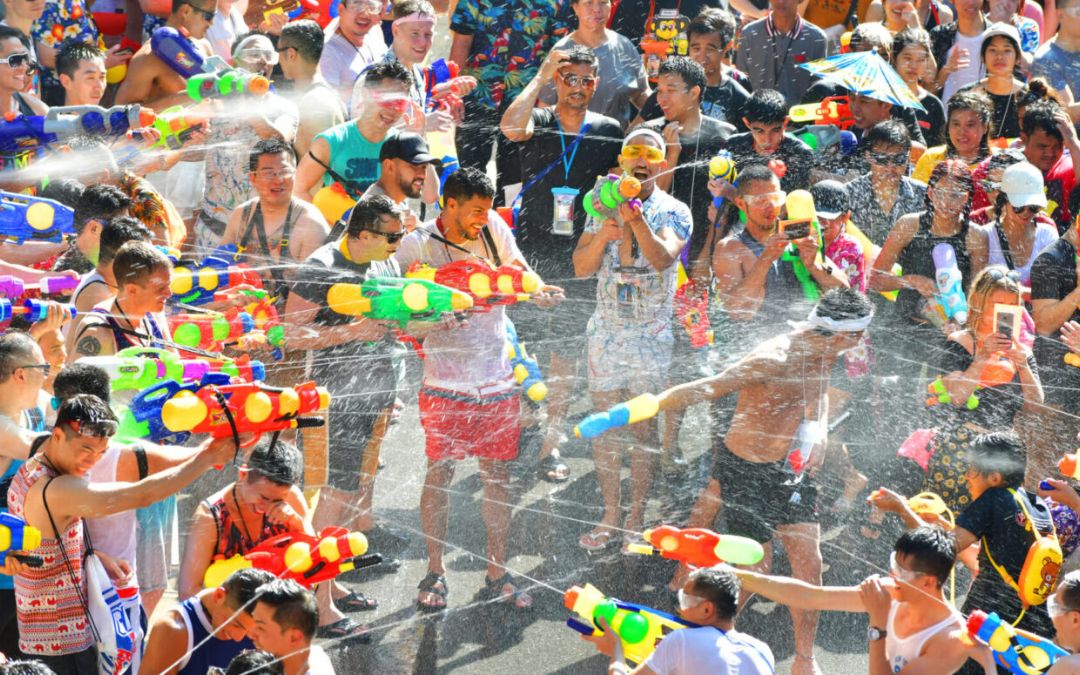
Water splashes cover streets when Songkran begins.
May
May is deeply spiritual. Visakha Bucha Day commemorates the birth, enlightenment, and death of the Buddha with temple visits and acts of kindness.
On a lighter note, Bun Bang Fai, or the Rocket Festival in Yasothon, sees homemade rockets launched into the sky to call for rain—complete with dancing, drinking, and parades.
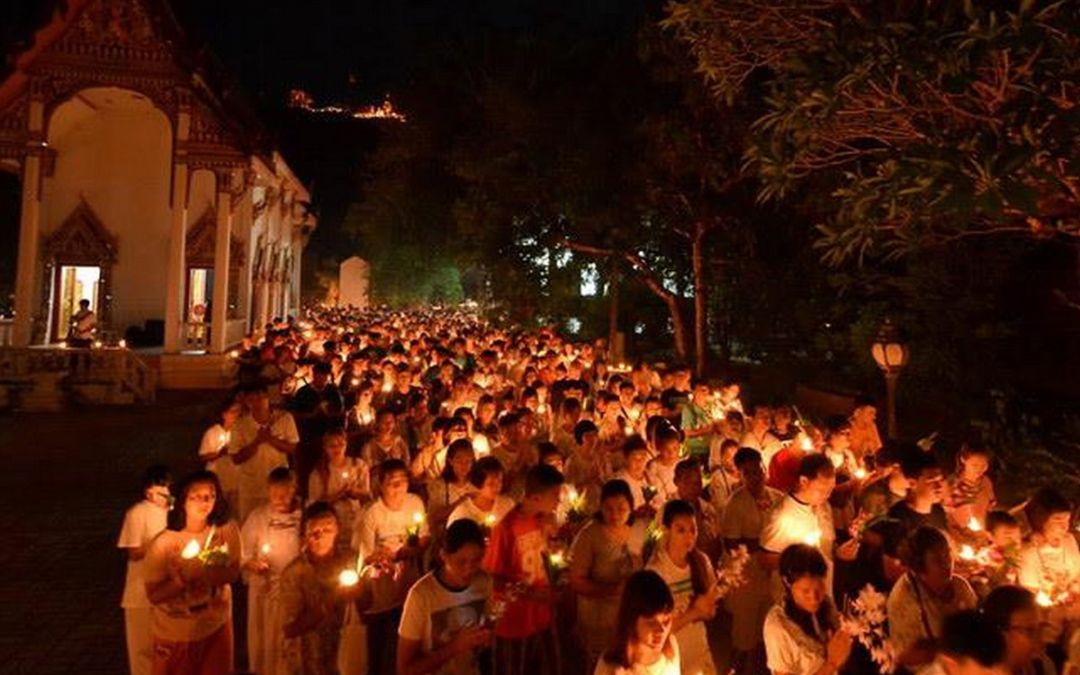
Temples across Thailand shine during Visakha Bucha Day.
June
Enter the world of myths and masks at Phi Ta Khon, also known as the Ghost Festival. Held in Dan Sai, Loei Province, locals dress in colorful ghost costumes, parade through town, and playfully blur the line between the spiritual and the silly.
July
As the Buddhist Lent begins, Asarnha Bucha Day reminds people of the Buddha’s first sermon. Many visit temples and practice generosity. In Ubon Ratchathani, the Candle Festival showcases intricate wax sculptures paraded through town—both artistic and deeply spiritual.
August
In honor of the Queen Mother’s birthday, Thailand celebrates Mother’s Day nationwide. Expect to see blue flags, jasmine flowers, and heartfelt tributes from children to their mothers in homes and schools across the country.
November
Two of the most magical festivals take place this month. Loy Krathong invites people to float candle-lit baskets on rivers and lakes, giving thanks to the water goddess. In Chiang Mai, this coincides with Yi Peng, where thousands of lanterns light up the night sky—an unforgettable sight of floating wishes.
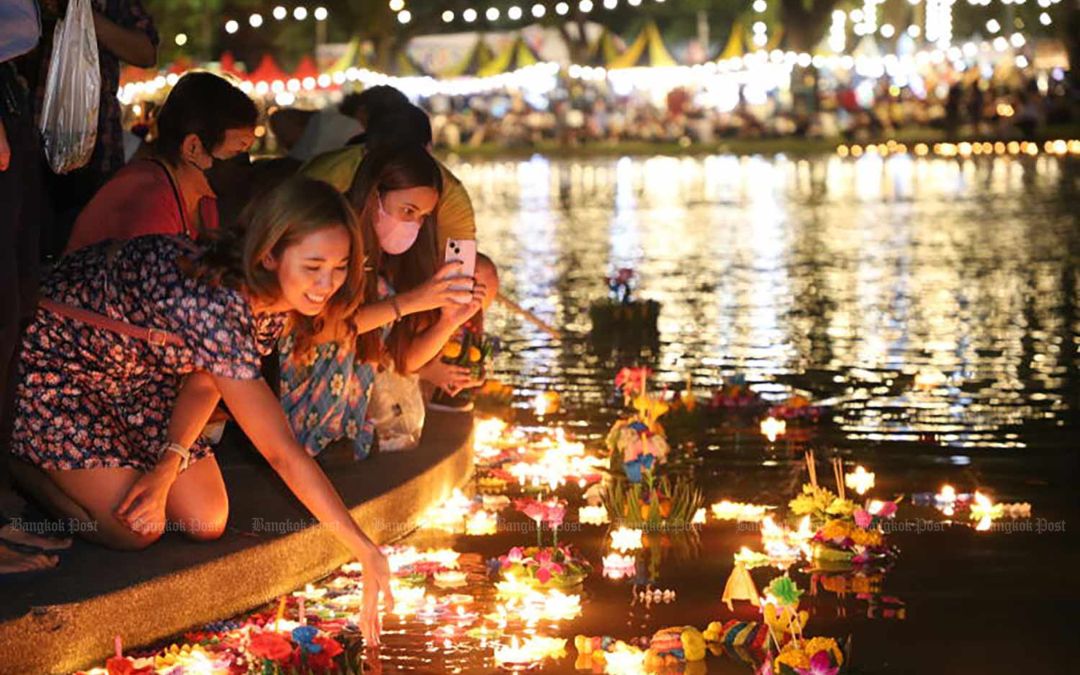
Lanterns float on rivers during the night of Loy Krathong.
December
The year ends with creativity and connection. The Wonderfruit Festival in Pattaya brings together music, art, food, and sustainability. It’s not just a party—it’s a space to dream, dance, and make a difference.
Top 7 Culturally Significant Thailand Festivals That You Cannot Miss
Here are the most meaningful and exciting festivals in Thailand that you should definitely experience.
Songkran – The Thai New Year Water Festival
Every April, Thailand turns into the world’s biggest water playground during Songkran, the traditional Thai New Year. Rooted in ancient traditions, this festival combines spiritual rituals with lively, nationwide water fights that draw visitors from around the world.
Songkran marks a time of renewal and purification. Water is used symbolically to cleanse bad luck and welcome a fresh start. For many locals, it’s also a time to reunite with family, visit temples, and pay respects to elders.
During this April festival in Thailand, travelers can witness people joyfully splashing water on each other using buckets, water guns, and even hoses. But beyond the fun, you might also witness locals cleaning Buddha statues, building sand pagodas at temples, or offering alms to monks.
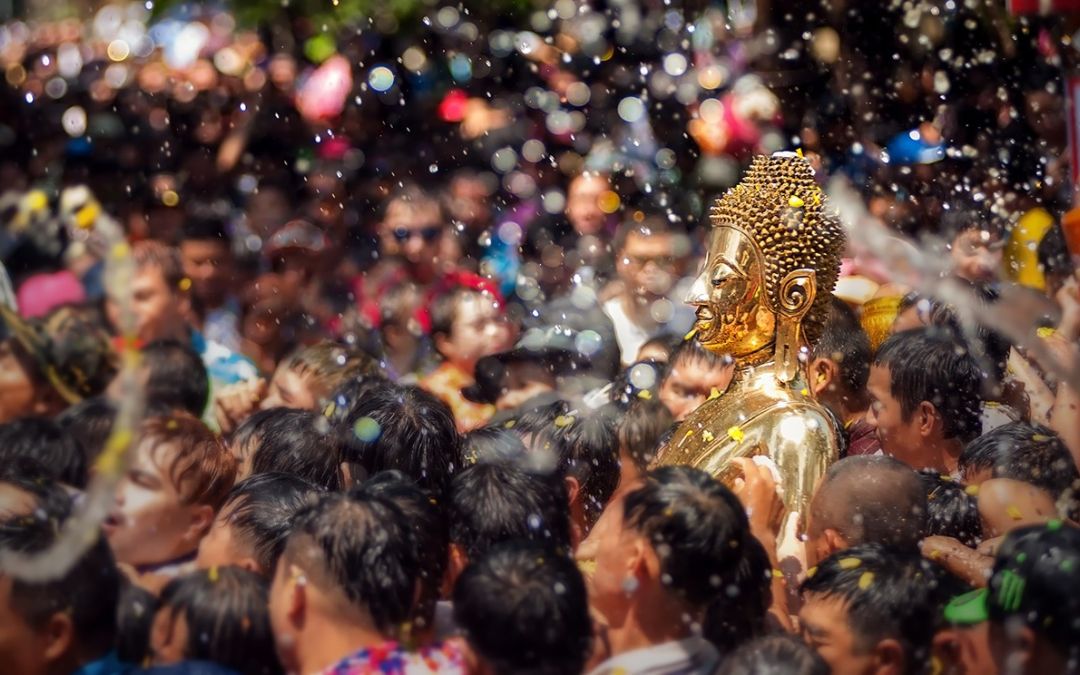
The old moat in Chiang Mai becomes a Songkran playground.
Best places to experience Songkran:
- Chiang Mai (the biggest and most iconic celebration)
- Bangkok (Silom Road and Khao San Road are hotspots)
- Ayutthaya (watch elephants spray water)
- Phuket and Pattaya (lively beach celebrations)
Travel tips:
- Wear light, quick-dry clothing—and don’t forget waterproof bags for your phone.
- Be respectful: avoid splashing monks, elders, or babies.
- Most public transportation services run on limited schedules during Songkran—plan ahead.
- Join early temple activities to see the traditional side of the celebration.
- Book your accommodations early, especially in Chiang Mai.
>> Read More: Tips To Enjoy Songkran Thailand
Loy Krathong – Festival of Lights
Held on the night of the full moon in November, Loy Krathong is one of Thailand’s most enchanting festivals. People gather near rivers, lakes, or canals to float small, beautifully decorated baskets known as krathongs, as a symbolic gesture of letting go of negativity and expressing gratitude to the water goddess.
This festival has roots going back over 700 years to the Sukhothai Kingdom. It’s a time when people give thanks to Pra Mae Khongkha, the goddess of water, and wish for good fortune and a fresh start. The act of floating a krathong represents a spiritual release and renewal, blending ancient tradition with personal reflection.
Participants light candles and incense, place them in a krathong made from banana leaves or eco-friendly materials, and gently float it on water while making a silent wish. Communities also host parades, cultural shows, and krathong-making competitions, creating a joyful and peaceful atmosphere.
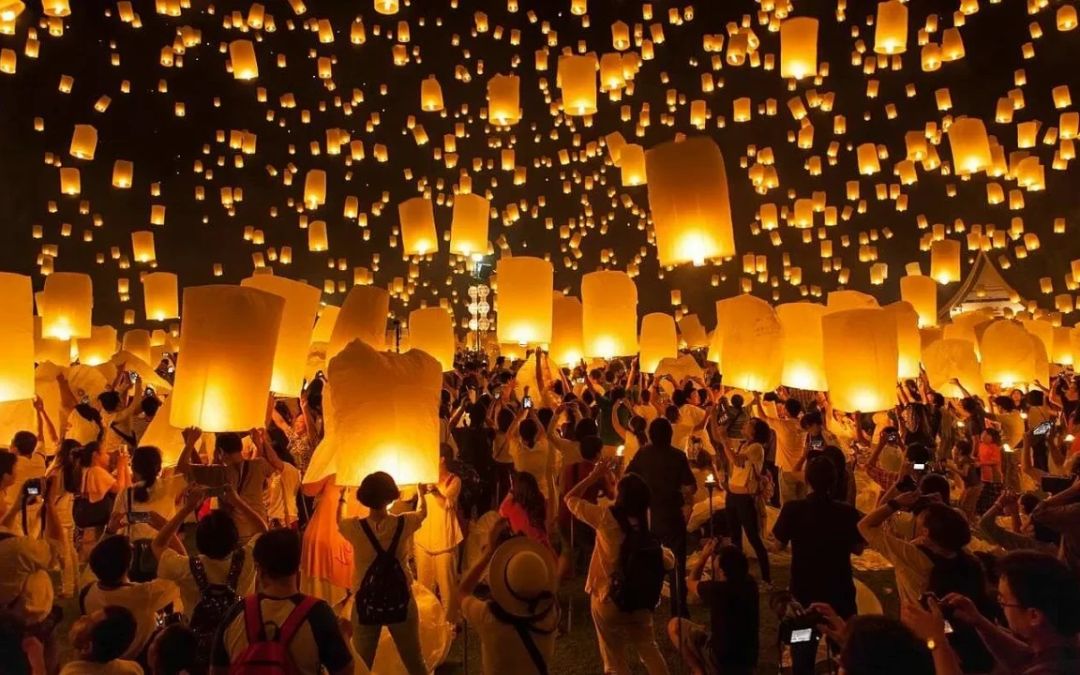
Decorated krathongs drift slowly on calm evening waters.
Best places to experience Loy Krathong:
- Chiang Mai (also features Yi Peng sky lantern festival)
- Sukhothai (the historical birthplace of the tradition)
- Bangkok (Chao Phraya River and Asiatique area)
- Ayutthaya (temple-lit surroundings add charm)
Travel tips:
- Arrive early to secure a good riverside spot for launching your krathong.
- Dress respectfully—avoid shorts and sleeveless tops, especially near temples.
- Look for eco-friendly krathongs made from natural materials.
- If attending in Chiang Mai, don’t miss the Yi Peng lantern release.
- Respect local customs: avoid alcohol in temple areas and do not litter.
Phi Ta Khon – The Ghost Festival
Phi Ta Khon is one of Thailand’s most unique and eye-catching festivals, celebrated in mid-June each year in the quiet town of Dan Sai, Loei Province. Often called the “Ghost Festival,” it’s a colorful blend of spirituality, folklore, and community spirit, where people dress as playful spirits and bring the streets to life.
The festival is linked to the legend of Prince Vessandorn, a previous incarnation of the Buddha. According to the story, when the prince returned from a long journey, his people were so overjoyed that their celebration was so loud it woke the spirits of the dead. Over time, this tale evolved into today’s festival, a celebration of fun, music, and spiritual significance.
Locals wear large, handcrafted masks with exaggerated features—long noses, painted fangs, and bright colors—while dancing through the streets to drums and music. The event also includes ceremonies at temples, lively parades, local performances, and opportunities for visitors to try their hand at making their own ghost masks.
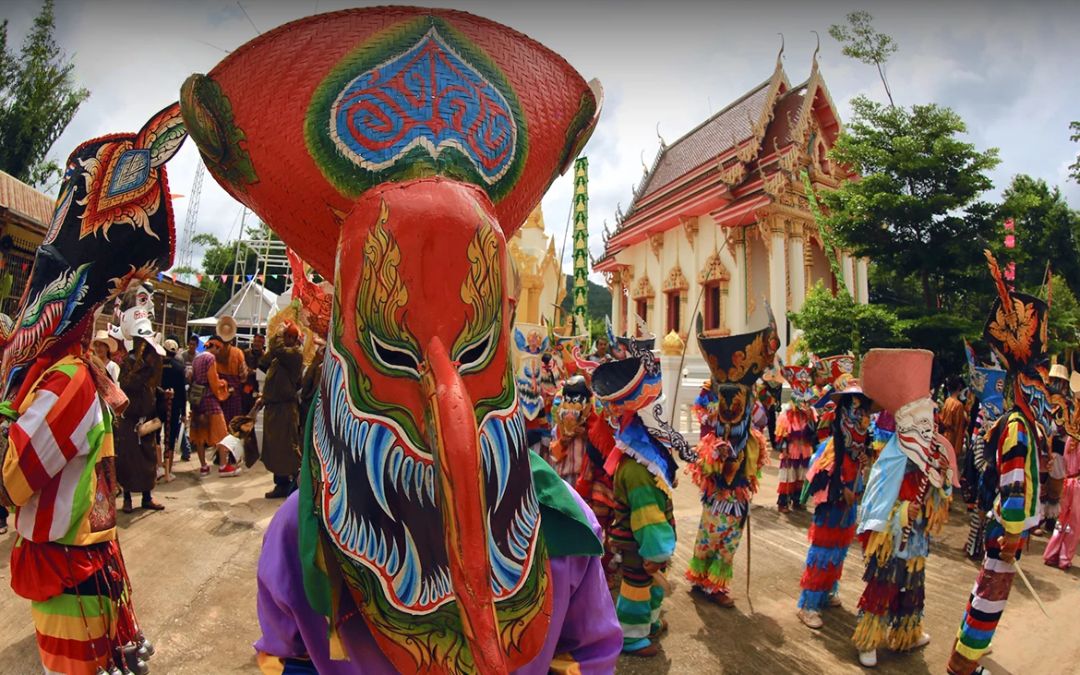
Colorful masks dance through the streets during Phi Ta Khon.
Best places to experience Phi Ta Khon:
- Dan Sai town, Loei Province (the only place where it’s celebrated)
Travel tips:
- Book accommodation in advance. Dan Sai is small and fills up quickly during the festival.
- Visit the Phi Ta Khon Museum in town for background on the traditions and mask-making.
- Don’t be afraid to join the parade. Locals are very welcoming to visitors.
- Wear breathable clothes and comfortable shoes, as most of the fun happens outdoors.
- Be respectful of the spiritual aspects; temple rituals are an important part of the event.
Yi Peng – Lantern Festival
Known for its magical sky lantern displays, Yi Peng is a northern Thai festival that fills the night with light and wonder. Celebrated in November, it usually coincides with Loy Krathong, creating one of the most visually stunning moments of the year, especially in Chiang Mai.
Yi Peng has roots in Lanna tradition and was originally held to mark the end of the rainy season. Today, it’s a beautiful blend of cultural pride and Buddhist belief, where lanterns symbolize releasing bad luck and welcoming good fortune.
Thousands of lanterns are released into the sky as people make silent wishes, creating a peaceful, dreamlike atmosphere. Streets, homes, and temples are decorated with glowing lanterns, and local ceremonies add to the spiritual tone of Thailand festivals.
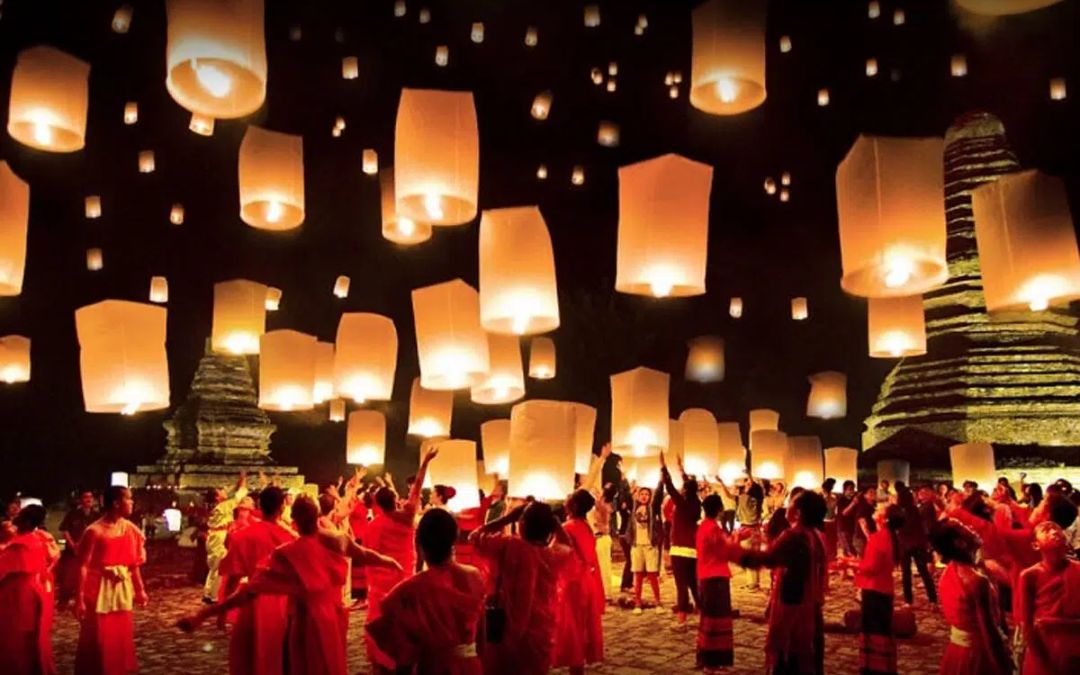
Thousands of lanterns lift into the sky for Yi Peng.
Best places to experience Yi Peng:
- Chiang Mai (the center of celebration with mass lantern releases)
- Mae Jo University (site of a famous large-scale lantern release)
- Temples across Northern Thailand (for quieter, traditional observances)
Travel tips:
- Arrive early at the main venues—popular lantern events get crowded fast.
- Wear respectful clothing—no shorts or sleeveless tops at temple sites.
- Use official or eco-friendly lanterns to avoid fire or environmental risks.
- Book tickets in advance if attending private or organized lantern release events.
- Be mindful: alcohol is not allowed at sacred or traditional celebration areas.
>> Read More: Yi Peng Lantern Festival – A Magical Experience in Northern Thailand
Bun Bang Fai – Rocket Festival
In the quiet rice-farming communities of northeastern Thailand, an extraordinary celebration lights up the skies each year. Taking place in May, the Bun Bang Fai Festival in Yasothon sees villagers launching massive homemade rockets to call upon the rain gods for a fruitful planting season.
The rockets are launched as offerings to the rain god, asking for generous rainfall to nourish the upcoming rice crop. For locals, it’s a mix of tradition, competition, and fun. Villagers work in teams for weeks to build their own rockets, some reaching up to 9 meters tall and packed with gunpowder, judged on both performance and style.
The festival unfolds over three days, starting with parades, music, and traditional dancing. On the final day, the rockets are launched into the sky one by one, leaving behind dramatic smoke trails as the crowd roars in excitement.
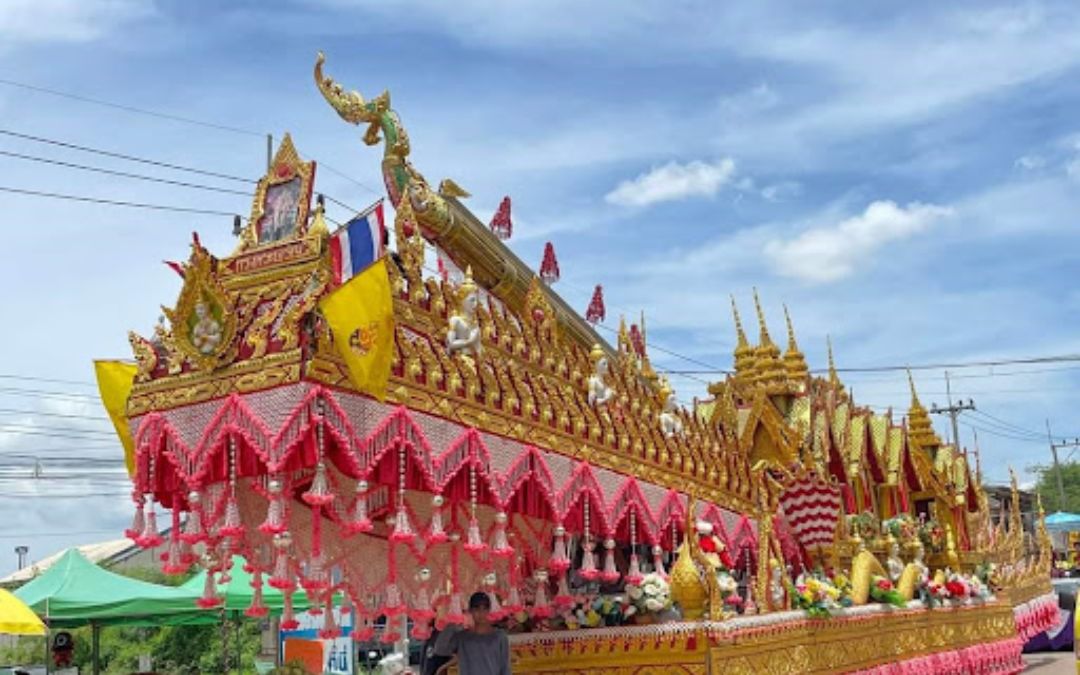
Rocket blasts from Bun Bang Fai echo through villages.
Best places to experience Bun Bang Fai:
- Yasothon City (the heart of the celebration)
- Suwannaphum District (another vibrant local version)
- Other towns in northeastern Thailand (Isan region)
Travel tips:
- Bring earplugs—the rocket launches are very loud.
- Arrive early for the parade and launch day to get a good viewing spot.
- Dress lightly and bring sun protection. May is hot and humid.
- Stay at a respectful distance from the launch area for safety.
- Be prepared for a wild, lively atmosphere; this is not a quiet celebration!
Ubon Ratchathani Candle Festival
Bursting with color, artistry, and tradition, the Ubon Ratchathani Candle Festival is one of the dazzling Thailand festivals of Buddhist faith and Thai craftsmanship. Held in July to mark the beginning of Buddhist Lent, the festival takes place in Ubon Ratchathani, a cultural hub in northeastern Thailand.
Centered initially on donating candles to temples for the rainy season, the tradition has grown into a large-scale event featuring intricately carved wax sculptures. These giant candles, often shaped into mythical creatures and Buddhist figures, are paraded through the city on floats accompanied by traditional Isaan music and dancers.
The streets come alive with candle-carving competitions, folk performances, and night displays where the glowing sculptures create a magical atmosphere. It’s not just a visual feast, but also a proud showcase of local beliefs and talent.
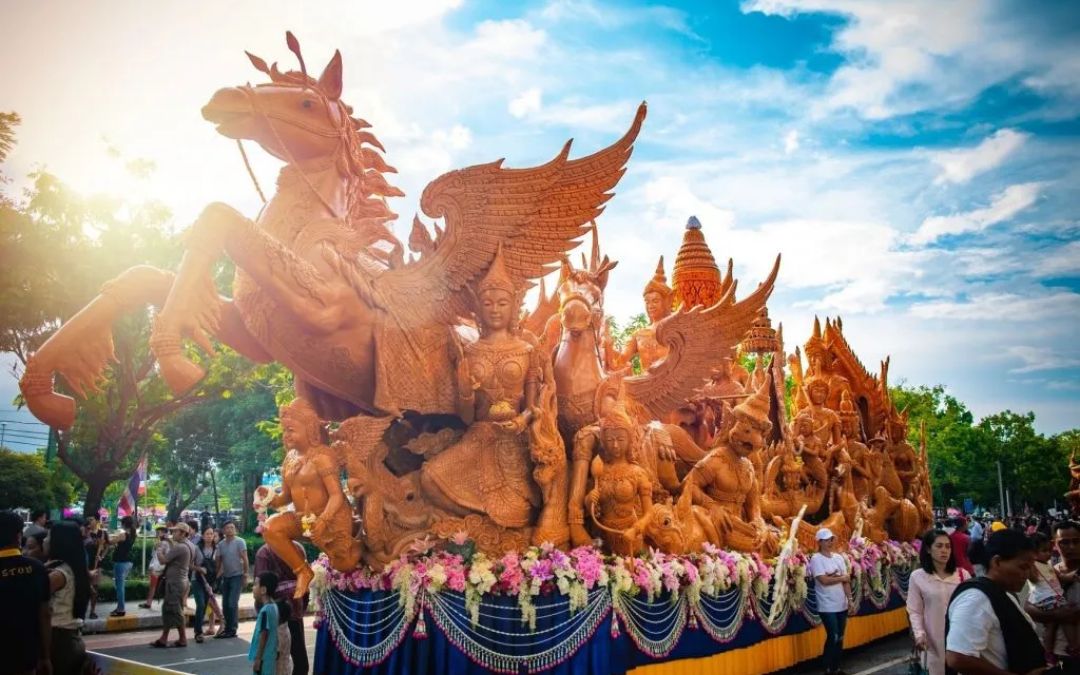
Wax candles shape giant art pieces in Ubon Ratchathani.
Best places to experience the Candle Festival:
- Ubon Ratchathani City (the heart of the celebration)
- Thung Si Muang Park (main venue for the parade and exhibitions)
- Local temples offering wax-carving workshops
Travel tips:
- Visit a few days early to watch the candle-making process at local temples.
- Bring a camera—the candle floats are truly artistic and photogenic.
- Stay hydrated and wear light clothing—it can get very hot during the daytime events.
- Don’t miss the evening candle lighting—it’s one of the most beautiful moments.
- If you’re interested in arts and culture, join a local carving workshop to try it yourself.
Chiang Mai Flower Festival
Every year, Chiang Mai welcomes February with a spectacular celebration of blooms, color, and creativity. Taking place during the first weekend of the month, the Chiang Mai Flower Festival turns the city into a living garden, attracting visitors with its charm and vibrant atmosphere.
The event is a long-standing tradition that celebrates the region’s rich horticultural heritage. While it draws thousands of visitors, it still maintains its friendly, local charm. Floral floats, traditional dancers, and marching bands parade through the streets, while Suan Buak Haad Park becomes a showcase for dazzling flower displays and competitions.
It’s a cheerful, family-friendly festival where you can enjoy music, shop local crafts, taste northern Thai food, and watch the crowning of the Flower Festival Queen. For many, it’s the perfect mix of beauty, culture, and community.
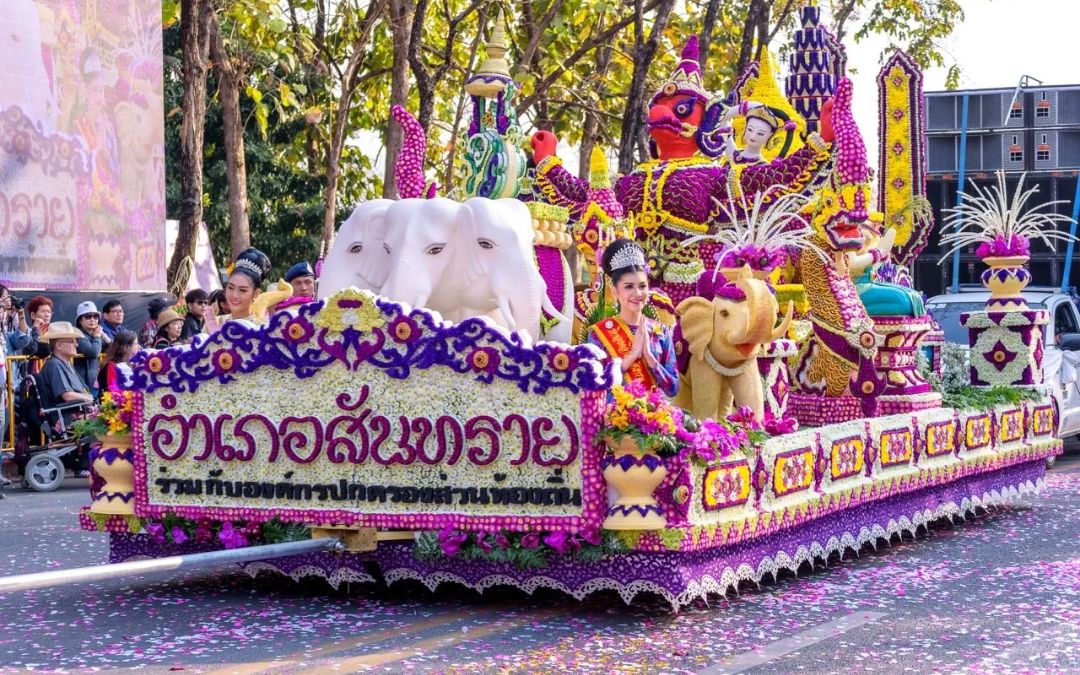
Bright blooms cover every corner during the flower festival.
Best places to experience the Flower Festival:
- Suan Buak Haad Park (main exhibition area)
- The Pae Road and Nong Buak Haad Public Park (parade routes)
- Chiang Mai Old City (local markets and food stalls)
Travel tips:
- Arrive early to find a good spot for the parade—it gets crowded fast.
- Bring sun protection because February is sunny and warm in Chiang Mai.
- Take your time at the park to see the floral art up close.
- Try local flower-themed snacks sold by vendors during the event.
- If you love photography, come with a fully charged camera—this festival is a visual treat.
>> See Tour: Essential Thailand
How to Prepare for Thailand Festivals: Travel Tips You Need to Know
Joining Thailand festivals is a rewarding experience, but it’s best enjoyed with a bit of preparation and cultural awareness. Here are some practical tips to help you make the most of your journey:
Plan Ahead
Many of Thailand’s major festivals—like Songkran in Chiang Mai or Yi Peng Lantern Festival—attract thousands of visitors.
- Book your accommodation at least 1–2 months in advance, especially in popular cities like Chiang Mai, Bangkok, or Yasothon.
- Domestic flights and train tickets around holidays can sell out fast—plan your transportation early.
- When attending ticketed events (such as private Yi Peng lantern releases at Mae Jo University), purchase tickets through official or reputable platforms.
Respect Local Customs
Thailand is a deeply spiritual country, and festivals often involve religious elements. Showing respect goes a long way.
- At festivals like Visakha Bucha Day or Ubon Ratchathani Candle Festival, wear modest clothing: cover shoulders and knees, especially when visiting temples.
- Remove your shoes when entering temple grounds.
- Avoid touching monks, especially if you are female.
- During Songkran, avoid splashing water on monks, elders, or babies—it’s considered disrespectful.
- Public displays of drunkenness are frowned upon during religious events—alcohol is often banned at or near temple areas (e.g., during Yi Peng in Chiang Mai).
Stay Informed
Festival dates in Thailand often follow the lunar calendar, which means they can change from year to year. To avoid missing out or showing up on the wrong day, it’s essential to verify the exact dates well in advance—ideally 1–2 months before your trip.
- Official sources: Check the Tourism Authority of Thailand (TAT) website (tourismthailand.org) for the most up-to-date festival schedules, announcements, and locations.
- Social media: Follow accounts like @tat_news_org on Instagram, Twitter, or Facebook for real-time updates and event confirmations.
- Local sources, such as hotel staff, tourism offices in cities like Chiang Mai, Bangkok, or Ubon Ratchathani, and local guides, often provide accurate, region-specific information.
- For regional festivals like Phi Ta Khon or Bun Bang Fai, check local government websites or Loei/Yasothon provincial pages, as these events are community-led and dates may shift slightly each year.
Don’t assume festival dates are fixed—always double-check before making travel plans.
Let the Festivities Begin — With Asia Pioneer Travel
From the glowing lanterns of Yi Peng in Chiang Mai to the fiery rockets of Yasothon, Thailand’s festivals are more than just events — they’re immersive celebrations of tradition, belief, and joy. Each festival invites you into the heart of local life, where colors burst, music echoes, and ancient rituals come alive.
If you’re ready to experience these unforgettable moments in the most authentic way, let Asia Pioneer Travel be your local companion. We will help you uncover the best celebrations, understand their cultural roots, and enjoy them with comfort, insight, and ease. Start planning your tailor-made Thailand festival journey today — and turn vibrant traditions into lifelong memories.
